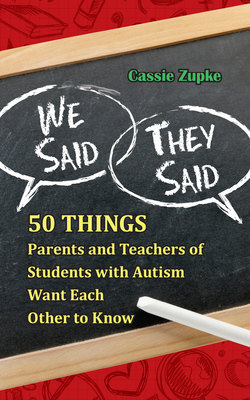Читать книгу We Said, They Said - Cassie Zupke - Страница 13
На сайте Литреса книга снята с продажи.
Оглавление
I'm being bombarded by information about autism. Unfortunately, 80% of it is false, misleading, or downright dangerous.
Up until a few years ago, it was hard to find information about autism and almost impossible to find any about mild autism. Now it seems to be on the cover of every magazine and newspaper—from Newsweek to Glamour to Parenting. My library and local bookstores have dozens of books, few of which agree with one another. Celebrities appear on my television, telling me how to cure my child. Some doctors are telling me autism is incurable, but others say they've found the answer. Google lists more than 18 million Web sites about autism, and most of them are selling something.
While some of the information is valid and helpful, most of it is hooey. The hooey may be the product of well-meaning, misinformed people, but there's a good chance it's been produced by someone in search of profit. For every tear we shed, someone tries to make a buck off of us. It's an ugly aspect of human nature and is unfortunately nothing new.
During my search for answers, I've been told so many things that sometimes I have a hard time sorting fact from fiction. I've heard that almost all doctors are pawns of the pharmaceutical companies, except for a few special ones, the only ones who really care about our kids. But they don't take insurance (insurance doesn't take them), and they happen to be very, very expensive. I've heard of special laboratories that run tests other labs can't because no one else knows how to do them. (If your child's results come back positive it means he needs the treatment; if they come back negative it means his body is retaining the toxins and he really needs the treatment.)
I've heard that my son's autism is my fault because I didn't play with him enough when he was a baby. I read that in many cases, autism is caused by using hair dye during pregnancy or having breast implants (but sources of information like these are anonymous). I've heard that one side of my son's brain grew more quickly than the other—thank goodness, though, there's a doctor who knows how to cure that. I've heard that vaccines cause autism—some researchers proved it, but other researchers say the first ones were wrong, and then there's another set of researchers who say the second batch of researchers was either paid off or they don't know what they're talking about.
I've heard that antidepressants can help, but if you pick the wrong one your child may commit suicide. I've heard of natural, behavioral, pharmaceutical, and psychiatric treatments, occupational therapy, sound therapy, deep nerve stimulation, spinning and bouncing therapy, magnesium supplements, Applied Behavioral Analysis, Floortime, TEACCH (Treatment and Education of Autistic and Related Communication-Handicapped Children), Relationship Development Intervention, staring deeply into a child's eyes until he is cured, having him wear colored lenses, enforcing sensory diets, reading social stories, offering special diets, taking dietary supplements, employing rubber chickens (for social-skills therapy), injecting vitamins, doing chelation therapy (stripping the body of heavy metals), taking hyperbolic oxygen treatments, having more parental consistency, using physical punishment, using restraint, putting children into isolation rooms or quiet rooms, giving more parental attention, making my son use his words instead of just giving him what he wants, taking the advice of Super Nanny, and getting a dog.
It's a lot of information. Some of it is great and would really help my kid. Some of it would waste my time and money and may even harm my child. But I can't always tell which is which. A lot of people are telling me that their solution is the right one, and some of them insist that if I don't listen to them, I'm a horrible parent who doesn't love my child. What if later I find out I could have cured him but I didn't try, because I didn't want to spend the money or because the treatment was too inconvenient for me? What if my choice hurts him? What if it kills him?
Even if I try to dig deeper for information, I may have difficulties. Chances are, I'm not a research scientist. I have no training in reading a study and evaluating it properly. Is a particular study well done? Is its population selected in an unbiased manner? Are its data statistically significant? Are the statistics it presents relevant or misleading? Who funded the study and why? Were the tests they used valid? How do they relate to tests used by other researchers? Are the study results repeatable? How is the study received by other researchers in the field? Why? Are the tests they used really measuring what they set out to measure? Were the data collected in a trustworthy manner? Major peer-reviewed medical journals sometimes can't sort this stuff out; they think a study is good science and publish it, only to retract it later. If they sometimes have trouble evaluating studies, how am I going to do it?
Sometimes I may disagree with you. It's not because I'm delusional, stupid, or lazy. Sometimes I'm doing the best I can just to swim in the flood of information directed toward parents of autistic children. If you think you have an answer for me, by all means share it. But don't be offended if I keep searching for another. After all, you may not be a research scientist, either.
